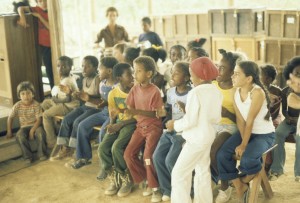By Sikivu Hutchinson
In mid-November, my new novel, White Nights, Black Paradise, on Peoples Temple and Jonestown will drop. So who are the players in the book ?
If you’re of a certain age, you probably remember the horror of seeing pictures of the 900-plus dead bodies of Peoples Temple church members, the majority of them African American, in Jonestown, Guyana in 1978. You may also know that the Jonestown massacre was where the overused misnomer “drink the Kool-aid” originated. Less known and understood are the actual people of Peoples Temple church; their hopes, dreams, world views, and motivations for going to Jonestown. As the largest religious murder-suicide in American history, Jonestown still elicits a resounding “why”?
The characters in my novel are a cross-section—they’re queer, lesbian, bisexual, trans, straight, African American, Latino, multiracial, white, age/class diverse and all over the map in terms of religious belief. African American sisters Taryn and Hy Strayer anchor the story with their at times turbulent relationship. The book opens with the sisters’ transition to segregated San Francisco from the Midwest. As an atheist lesbian and straight agnostic, they’re attracted to Peoples Temple’s anti-racist ethos, secularism and seeming tolerance. Their diversity reflects the distinctive tenor of the church and forms the backbone of the novel’s mélange of voices. Each person joined the church, stayed with it, or left, for complex reasons that often reflected deep ambivalence and contradiction. For Black members, emigration to Jonestown embodied just another leg of the African Diaspora. Far from being brainwashed dupes, many of the members actively collaborated in the dream—and nightmare—of Jonestown.
The atheist—Taryn Strayer: “In third grade she learned the unreliability of the Lord. She called on him to annihilate the cackling, drooling pinheads who wanted to see her fuck up. What was the Lord God Almighty good for if he couldn’t pull off a small favor after a week’s worth of goodness from her?”
The seeker—Hy Strayer: “The people that are over there building Jonestown say you chop a tree down and it’s got milk and honey for sap. Prime minister, the cabinet, everybody over there in power’s black except for a few Indians who’re taking orders from us.”
The loyalist—Jess McPherson: “That girl’s mother gave up that right when she let her become a drug addict and run the streets all hours. No daddy. Thirteen and running the streets. Think that’s acceptable? That’s the case with most of these parentless kids before they came to Jonestown. If they weren’t here their asses would be dumped or left for dead in juvenile hall. This is the last hope for them to get their lives together.”
The journalist—Ida Lassiter: “Everywhere, the air changed with the faintest whiff, the hint, of a white woman. When it was crowded to overflowing Goldilocks couldn’t even dip a toe onto a train car north of the Mason-Dixon without a regiment of crackers overseeing every move, making sure no Negro man woman or child twitched, sneezed or batted an eye in her direction. Under the law Negresses could never be raped. And this kept white women safe in their kingdoms.”
The defector—Foster Sutcliffe: “There’s a succession plan. The whites get positioned over us plantation style, load up their offshore accounts and live off the interest until Fidel smuggles them into Cuba or Brezhnev gives Jim Jones the key to Ukraine.”
The doctor-publisher—Hampton Goodwin: “I can still hear the laughter of that first cracker who doubted I would make it through medical school. An Irishman. Naturalized citizen with god given rights as soon as he stepped foot here. Master of the split infinitive, could barely speak English but he knew he wasn’t a nigger and that’s all that mattered.”
The teacher-interrogator—Ernestine Markham: “The church is the people, not any one man. God gave me a purpose with this church. Gossip and innuendo, especially on the Temple, are going to be big hits when all people know about is black people and black organizations being in disarray.”
The white preacher—Jim Jones: “We see white people living up in the hills with serious capital and riches, and black people living in the ghettoes with barely a collective pot to piss in. The fascists want to tell ya’ll that you’re lazy but they’re in collusion with the Judeo Christian ‘God’.”
The enabler—Mother Mabelean Jones: “I’ve turned the other cheek like the righteous leaders, Gandhi, Reverend King, Martin Luther. Even when I saw our people bruised and beaten, witnessed hordes of disgraced members chewed up and spit out like rotten meat, a corner of me protested but said Yes.”
The writer-survivor—Devera Medeiros: “By the time the assassins were through they’d blasted out the roof of the plane. Devera could stand up and touch the clouds from her seat. She could see clear out over the trees, past the bowing rainforest, past the valley of the shadow of death to her people, eating each other alive in Memorex.”




Oh, wow. Must “request a purchase” via my public library system(s). Sounds like a very powerful read.
I was 10, and growing up in the SF Bay Area. It was a. big. deal.
But only with the 30-year anniversary documentaries and attention did I really get any adult understanding of how awful it truly was.